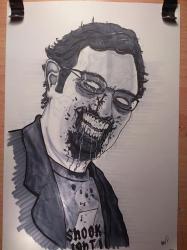So. Wrath of Khan. Everybody knows Wrath of Khan, right? No?
Huboy. I’m sure there’s people out there who’ve never seen Wrath of Khan. You know who you are. Probably the same people who’ve never watched Star Wars, or don’t watch Doctor Who. And if that’s you, I think you’ve come to the wrong place. Still, Wrath of Khan, yeah. Oh and BTW, if you think I’m talking about Star Trek Into Darkness, firstly just please stop; and secondly HERE BE SPOILERS!
Okay then. Considering the viewing public’s ability to look at virtually everything more than 6 months old through 20/20 rose-tinted vision, I suppose the question has to be asked if, after 33 years, the second Star Trek movie still stacks up. Can it exist as a classic in its own right, or are we just examining it with the same kind of heady nostalgia that allowed Jar-Jar Binks to go unpunished in a revenge frenzy last seen in Kill Bill?
The backstory on this one is kinda interesting and (fortunately) pretty much unique in the history of Hollywood. After spending eight years trying to get Star Trek back on TV, Gene Rodenberry’s vision of Star Trek: Phase 2 got the greenlight from Paramount in 1977, only for the studio to scrap the series months later and commission a feature-length movie instead. The script of the 50-minute Phase 2 pilot was padded out to over two hours, production started before the script was even completed, ran late and came in massively over budget. Critics panned the slow pacing and lack of menace, some claiming it to be a poor retread of 2001: A Space Odyssey.
Still, it turned a profit and Paramount were keen to build on it. The studio proceeded to sideline Rodenberry, blaming his story for the first movie’s critical failure, and approached producer Harve Bennett of the company’s TV division. Bennett states that when he stated he could make a better movie than The Motion Picture, Paramount executive Charles Bluhdorn asked, “Can you make it for less than forty-five-f*@&ing-million-dollars?” Bennett replied that “Where I come from, I can make five movies for that.” Maybe not the auspicious of starts, especially when young, relatively untested director Nicholas Meyer was hired to helm the project. But the philosophy of dropping everything that didn’t work and reworking what did paid off spectacularly despite an eye-wateringly tight budget restriction.
So, the eternal question: 33 years later, is it still any good, especially in light of the JJ Abrams reboots? Short answer, yes. Longer answer, hell yes. There were three occasions in 80s moviemaking where everything truly came together, where director, cast, script, everything just meshed to create bottled lightning. Ghostbusters was one; Back To The Future another. Wrath of Khan is the third.
The terrifyingly slow pace of The slow-Motion Picture is abandoned in favour of a far more cinematic adventurous tone. The fact that twelve years had elapsed since the end of the TV show is addressed with the crew of the Enterprise beginning to split up: Kirk is a desk-bound Rear-Admiral going stir crazy as he hits his 50s like a man desperate to run out and buy a Porsche; Chekhov is now first officer on a different ship; Sulu on the verge of his own command; and the Enterprise herself relegated to a cadet training ship under Spock’s command. But then lob genetically-engineered tyrant Khan Noonien Singh into the mix, freshly escaped from exile to a now-dying planet by a James Kirk who never even thought about going back to check on him, along with a scientific project-turned-doomsday device and suddenly the crew are in their element again.
Casting and direction are spot-on. Meyer does his damnedest to get the best possible performance out of every single actor, but none more so than Ricardo Montalban as Khan. His Ahab-like fixation on vengeance over the man who exiled him has clearly driven the character stark-raving mad and Montalban plays it with aplomb. He quotes Moby Dick frequently, only seeing the ironic comparison at the end. Hell, he even cripples the Enterprise’s engines and power system, rather than destroying the ship outright, so he can radio Kirk and gloat at victory before delivering the finishing blow. The role became so iconic that even when doing voiceover work in his later years, writers still dropped Wrath of Khan references into Montalban’s dialogue.
Two themes run throughout the movie, of time passing and that actions have consequences. This time, the cast aren’t lathered with a plasterer’s trowel of foundation in order to disguise wrinkles and pretend they’re ten years younger. Time has passed and things are different. But most shockingly of all and a first in Star Trek, is that your actions have consequences. Someone call maintenance, the reset button is out of order. We meet one of Kirk’s exes and their son. Khan, someone Kirk probably never gave a second thought to, hijacks a Federation starship and is hell-bent on revenge for his years of exile. But of course the most jarringly brutal example is Spock’s death, sacrificing himself in a radiation-filled chamber to repair the Enterprise’s engines.
This scene, and the funeral that follows it, give Leonard Nimoy and William Shatner the ability to prove their acting chops once and for all, with the dying Spock still trying to console his friend despite suffering agonising radiation poisoning, and then Kirk struggling to maintain his composure and the air of authority his rank demands as he delivers the eulogy. It’s probably most telling about the emotional impact and legacy of the film that YouTube clips of these scenes were shared millions of times on social media in the days after Nimoy’s death on 27 February 2015.
So yes, it still stands up. And yet, I still feel a bit melancholy about the movie. Maybe it’s because the subtitle of the next movie, The Search for Spock, tells you that his death wasn’t permanent. Maybe it’s because the film represents something of a creative high point, that Star Trek was only this daring with its storytelling three or four more times in more than three decades. Maybe it’s because Paramount went on to recast Benedict Cumberbatch as Khan in a film that spent its last half ripping off this one and then crapping all over it. Who’s to say? All I know is, any movie where a ghostly pale beanpole with the most upper-class English accent ever is cast as a super-strong warlord from northern India will never trump this. Never.
Full marks. Still.




Nerd Comments